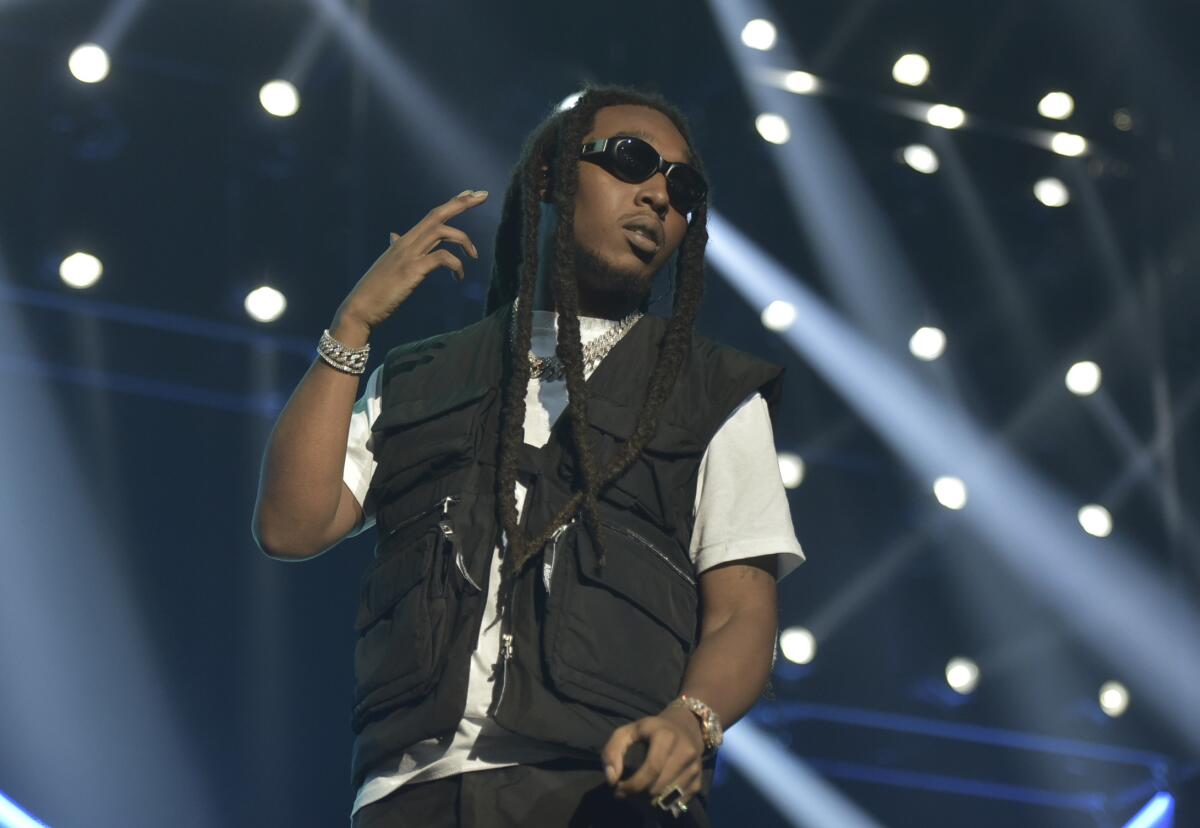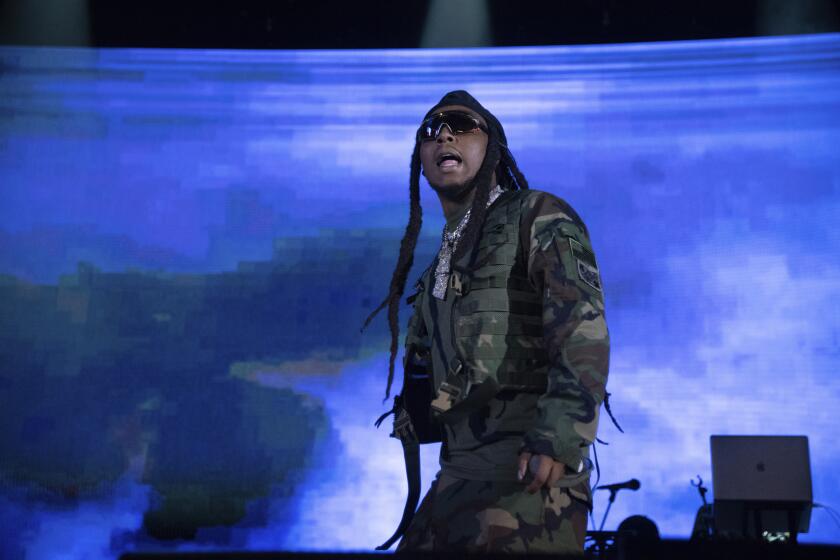Migos’ Takeoff had already changed the sound of hip-hop. He was just getting started on a new chapter

- Share via
Hip-hop wouldn’t sound the same without Migos.
The trio of Atlanta rappers — Offset, Quavo and Takeoff — dominated the 2010s as they built a catalog of booming trap hits like “Handsome and Wealthy” and “Hannah Montana” before entrenching their place in the mainstream through 2016’s “Bad and Boujee,” which shot to No. 1 on the Billboard Hot 100. Their rapid-fire triplet delivery, termed the “Migos Flow,” showed up even when they didn’t, becoming the factory-standard cadence for a generation of rappers and spilling over into pop on Ariana Grande’s “7 Rings.”
But earlier this year, the group split up; Offset (Kiari Kendrell Cephus) left due to an issue that his cousin Quavo (Quavious Keyate Marshall) said was centered around “loyalty.” In response, Quavo and Takeoff (Kirshnik Khari Ball) rebranded as Unc and Phew (short for uncle and nephew, their familial relationship) and released an album, “Only Built for Infinity Links,” in October. The LP built on the pair’s natural chemistry, with Takeoff’s raspy bellow cutting like an X-acto knife through Quavo’s smooth melodies.
This new beginning, though, was short-lived. Early Tuesday morning, Takeoff was fatally shot outside a Houston bowling alley. He was 28.
Two other people were injured and taken to hospitals in private vehicles, police said Tuesday. No arrests have been announced.
Rapper Takeoff of the Atlanta trio Migos died early Tuesday in a shooting outside a bowling alley in Houston. He was 28.
Migos was one of hip-hop’s most dominant groups, in an era when solo acts proliferated. Takeoff’s value to the group is best displayed on a song like 2014’s “Fight Night,” where he starts the song with an intimidating call-and-response chant before barreling through on his verse.

Sadly, Takeoff’s most viral moment was not because of his presence but his absence on “Bad and Boujee.” Instead of Takeoff, the song featured Lil Uzi Vert alongside Quavo and Offset, subjecting Takeoff to internet memes amid an awkwardly confrontational interview at the 2017 BET Awards.
But elsewhere on Migos’ landmark album “Culture,” Takeoff’s impact is undeniable — whether it’s the stutter-stop flow he uses on “T-Shirt” or his stomping chorus over the church organs of “Call Casting.” The group earned a Grammy nomination for the album, which went No. 1 on the Billboard 200.
The next year, he seized the spotlight on his first and only solo album, “The Last Rocket.” The atmospheric project allowed him greater autonomy over his sound, the delicate bells of “Casper” were a fitting sound for a trip through space. A year after he was left out, he became the main event, debuting at No. 4 on the Billboard 200 while breaking two songs into the Hot 100.
BET, Desiigner, Lecrae and Ja Rule are among those mourning the loss of Takeoff after the Migos rapper died Tuesday in a Houston shooting.
Takeoff was born June 18, 1994, in Lawrenceville, Ga. In high school, his focus was on music, while his uncle and cousin were preoccupied with sports, but Takeoff soon convinced them both to join him and form a rap group.
“A lot of people don’t notice that Takeoff was really the glue of the Migos,” said A.R. Shaw, author of “Trap History: Atlanta Culture and the Global Impact of Trap Music.” “They kind of followed him, even though he was the youngest. A lot of people consider him the best lyricist in the group, even though he was more quiet and reserved.”
The trio dropped their first mixtape as Migos in 2011, titled “Juug Season,” and initially aligned themselves with Gucci Mane’s 1017 record label. After Gucci was arrested in 2013, however, Migos joined Quality Control, the then-new label founded by Kevin “Coach K” Lee that would anchor them through their rise.
Migos’ initial run helped propel Atlanta to the forefront of mainstream hip-hop, perfectly timed alongside the emergence of new stars like Future, Young Thug and 2 Chainz. Following an era where T.I., Jeezy and Gucci Mane ruled the city, Migos made their mark by prioritizing rhythm in their vocals, infusing energy into early hits like “Hannah Montana.”
“Atlanta is a city that reinvents itself every four or five years,” Shaw said. “Jeezy, Gucci and T.I. were going to have to hand that baton off at some point, and Future, Young Thug and Migos picked it up and took it to a new level.”
Migos’ initial breakthrough arrived on 2013’s “Versace,” where the group built an ode to the Italian luxury brand based on the soon-to-be-ubiquitous triplet flow. They weren’t the first to use the cadence — it had been used by ’90s-era predecessors such as Public Enemy and many others in between. But when Drake adopted the flow to remix Migos’ “Versace” in 2015 it took on a new life, becoming a staple in modern rap that’s endured through the decade.
“You heard Drake do it, then you heard Jay-Z do it, then you heard Jay Electronica do it,” Shaw said. “Everybody was doing the Migos flow. You realized they weren’t just an average Atlanta rap group.”

Internally, Takeoff’s skills received their due — Quavo said in a 2018 interview with Apple Music that Takeoff was “the best one out of all of us,” a statement met with humility from Takeoff, who quietly asked Quavo to dial it back. But Takeoff was aware his public persona wasn’t quite at the level of his group members (Offset is married to pop-rap star Cardi B).
Speaking with N.O.R.E. on the “Drink Champs” podcast a few weeks after his album with Quavo was released, Takeoff admitted he was compelled to bring a different energy to the project and take advantage of his expanded role alongside his uncle.
“Enough is enough,” he said. “I’m laid-back and I’m chill, but it’s time to pop it. It’s time to give me my flowers. I don’t want them to lay down when I ain’t here, I want them right now.”
“True fans know he had a great impact on hip-hop,” Shaw added. “Years from now, people will look back and say this guy was a good dude, a great talent. The city of Atlanta lost a tremendous figure.”
More to Read
The biggest entertainment stories
Get our big stories about Hollywood, film, television, music, arts, culture and more right in your inbox as soon as they publish.
You may occasionally receive promotional content from the Los Angeles Times.












